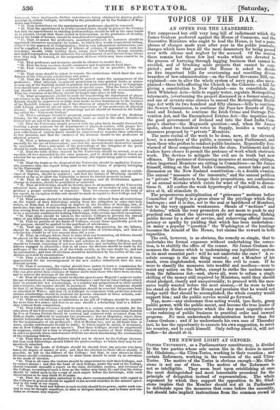TOPICS OF THE DAY.
AN OFFER FOR TILE ADERSHIP.
TILE compressed but still very long bill of indictment which Sir James Graham preferred against the House of Commons, and the Executive Ministers who ought to lead the House, is but a pare. phrase of charges made year after year in the public journals; charges which have been all the more damnatory for being passed over with silence and neglect by the accused. Of the session there remain but those few last weeks which are devoted to the process of hurrying through lagging business that cannot be avoided, and of brushing aside projects that cannot be com- pleted ; and in that period the House is asked to decide on five important bills for overturning and resettling divers branches of law-administration-on the Casual Revenues Bill, an_ explained-one to alter the whole system of navy pay, also unex- plained-three bills affecting the Church in the Colonies-a bill for giving a constitution to New Zealand-one to consolidate the Irish Whiteboy Acts-bills to supply water, regulate Metropolitan interments, (overturning the project discussed in a former session,) and one of seventy-nine clauses to amend the Metropolitan Build- ings Act with its two hundred and fifty clauses-bills to continue the Sewers Commission, to continue the Poor-law Boards of Eng. land and Ireland, to continue the Irish Crime and Outrage Pre- vention Act, and the Encumbered Estates Act-the inquiries into the good government of Ireland and into the East India Com- pany's charter-the Maynooth question-and, when Sir James spoke, about two hundred votes m Supply, besides a variety of measures proposed by ".private " Members. The mere recital of the work to be done, now, at the eleventh hour, is a mockery of the public, a censure upon Parliament, and upon those who profess to conduct public business. Repeatedly fore- warned of these congestions towards the close, Parliament and its leaders have chosen to permit the pretence of work which obstructs work. The devices to mitigate the evil are in truth but new offences. The pretence of discussing measures at morning sittings, when important Members are sitting in Committees-as Sir James himself, sitting on the East India Committee, cannot take part in discussion on the New Zealand constitution-is a double evasion. The annual "massacre of the innocents," and the annual petition to " private " Members to forego their propositions, are confessions of an annual mistake which exists for want of the will to discon- tinue it. All confess the weak hypertrophy of legislation, all con- nive at it, all stimulate it.
The preposterous multiplication of "grievance" motions before Committee of Supply is a gross abuse of the privilege which they burlesque ; and it is due, not to the zeal or hardihood of Members, but to the very opposite weaknesses. Shoals of " motions " and "debates," which the very promoters do not mean to push to any practical end, attest the universal spirit of compromise, filching public favour by a show of service' and subserving official incom- petency or apathy by yielding that which has been undertaken: on many a popular ' question " the Washington of the hustings becomes the Arnold of the House, but claims the reward in both capacities.
The evil, however, is so obvious, the remedy so simple, that to undertake the formal exposure without undertaking the correc- tion, is to stultify the office of the censor. Sir Tames Graham de- nounces the disease which is undermining our legislative system in its most essential part : will he not undertake the cure ? A re- solute courage is the one thing wanted; and a Member of his mark, even singlehanded, would cause the evil to cease. If he were to classify the measures into needful and needless-were to resist any action on the latter, except to strike the useless names from the fallacious list-and, above all, were to refuse a single shilling of the money still required by Ministers, until they should stand pledged, clearly and unequivocally, to proceed with the mea- sures really wanted before the next session,-if he were to take his stand on the floor of the House and proclaim that he would not budge until that should be accomplished the whole country would support him; and the public service would go forward.
Nay, more-any statesman thus acting would, ipso facto, grasp public power, with the public assent, and become the true leader of his country in that enterprise which the day most urgently needs -the reducing of public business to practical order and onward progress. No man understands administration better than Sir James Graham ; and if he understands his own case of Thursday last, he has the opportunity to execute his own suggestion, to serve his country, and to exalt himself. Only talking about it, will not suffice-he should do it.


























 Previous page
Previous page